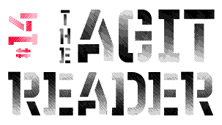
You Can Fly on My Aeroplane
Asterisk
Reissue label Numero Group has shown Columbus a lot of love over the years. In fact, its first release and the first in its Eccentric Soul series was the immeasurably wonderful Capsoul compilation that they put out in 2003. Last year the label released a compendium of the Prix label, another Eccentric Soul album almost equal to the first. Also last year, they issued the Four Mints’ 1973 full-length debut, Gently Down the Stream, on its Asterisk imprint. In short, the Chicago-based label has taught me more about the Columbus soul scene of the ‘70s than a decade of living here has.
A follow-up to the Four Mints CD as the second in a planned trio of Columbus soul albums, the label has released You Can Fly on My Aeroplane, the sole album by Wee from 1977. The band was largely the project of Norman Whiteside, an early protegee/peon of Capsoul head Bill Moss. Whiteside’s story is filled with petty crime, a constant struggle for subsistence and the finances to support his musical aspirations. Indeed, to support his first recording session (at Musicol, a Columbus institution still going strong) he forged one of his mother’s checks when he was 15. Released under the Owl imprint (the name of the studio where it was recorded) but essentially self-released, this album was basically financed by prostitution. Whiteside was kidnapped by a couple ladies of the night who gave him the money to start recording the record in exchange for his companionship. The women eventually introduced Whiteside to one of their clients; his credit appears as “Produced by William Muller for Bromo Productions.” Whiteside eventually found himself in the Ross Correctional Institute, and at the time of the CD’s production was still behind bars.
Unfortunately, the music isn’t as interesting as the backstory. Whiteside and his collaborators stick to stock, sultry funk, mimicking Stevie and Sly at equal turns. This comes off best on the title track and “Alone,” which will be recognizable to anyone familiar with RJD2’s sampling work. Here, Whiteside and the band tap into some nice grooves, blending reverberating keys with laidback rhythms. But the rest of the album (Numero expanded the record from its original nine tracks to 19), suffers from way too corny come-ons and downright laughable lyrics. “Put It in Real Good” is as obvious as it sounds, a simplistic blending of innuendo and funk. The writing on “I Want to Show You” might not be so bad, if only it was meant to be as comical as it is. The best/worst comes when Whiteside expresses the depth of his feelings and sings, “Show appreciation in many ways: Take you to movie shows, play in the rain. Buy you a new used car, get you a ring.” I wonder what it would take for her to get a new, new car?
So while Numero Group’s continued interested in the Agit hometown is appreciable, this album, not so much. Of course, there’s the question of what might have been if Whiteside had more resources at his disposal (or more prostitutes backing him), but a more intriguing proposition is what will be the next result of the label’s Columbus cratedigging.
Stephen Slaybaugh
PAST PERFECTS
Another State of Mind
Delicious Vinyl All-Stars, Rmxxology
Felt, Crumbling the Antiseptic Beauty
Siltbreeze's Tard & Further'd
U2, Boy, October and War
Teenage Jesus and the Jerks, Beirut Slump/
Shut Up and Bleed
Black Sabbath, The Rules of Hell
David Bowie, Live Santa Monica '72
Children of the Sixth Root Race, Songs from the Source
Blondie, Parallel Lines Deluxe Collector's Edition
Mogwai, Young Team
Steinski, What Does It All Mean?
